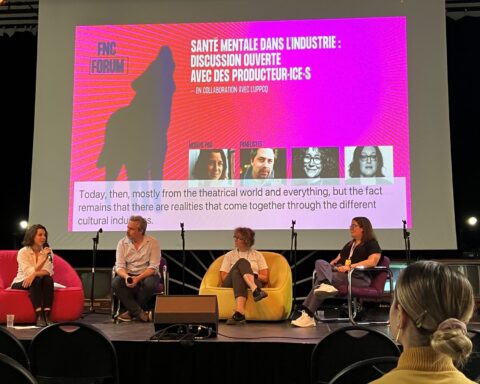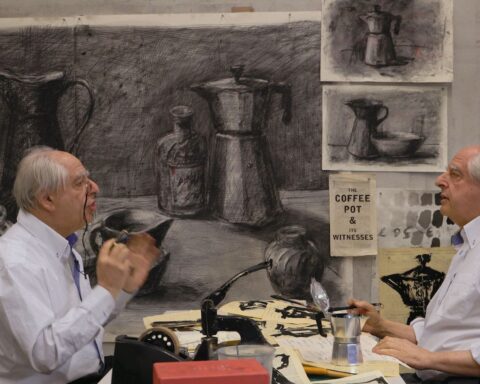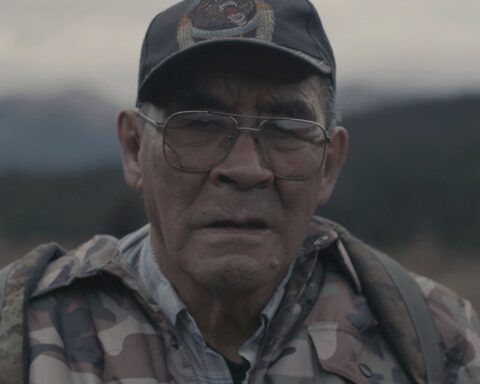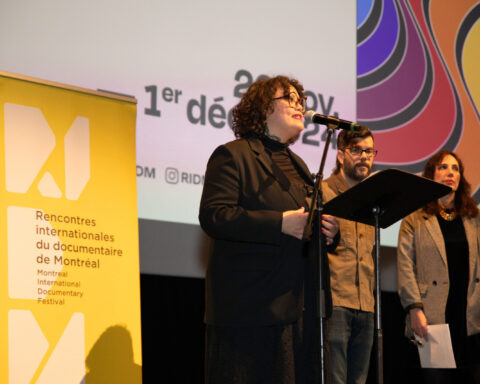On Thursday, March 26, the Documentary Organization of Canada (DOC) hosted an industry-wide forum to discuss the effects of COVID-19. Representatives from various funders, broadcasters, and industry stakeholders joined DOC in getting filmmakers up to speed about the state of the industry and to listen to the concerns of filmmakers.
POV is pleased to share a summarization of the forum thanks to DOC.
Introduction
Canada has an amazing documentary community, a wealth of documentary talent and a rich documentary culture that has been built up over the past 80 years. As you all know, it is work with tremendous social value but it’s far from lucrative. Documentarians are an economically vulnerable group at the best of times. And now this. Everyone in the entire world is obviously being impacted greatly by COVID-19: within the screen sector, documentarians are one of the hardest-hit groups.
DOC organized this forum on March 26 as a community space to share knowledge, strategies, and ideas for navigating the impacts of COVID-19 in the spirit of our collective desire to support one another and make sure our community pulls through this ok.
Participating panelists represented funding groups, broadcasters, our public producer, business affairs and festival expertise. Panelists shared as much as they know at this point in time – obviously, there is still a lot that is unfolding and, therefore, a lot of unknowns.
DOC will organize a second webinar in about two weeks’ time when we know more about how funders, broadcasters, and others are coordinating their efforts and as new sector-specific supports are announced by different levels of government.
The following is a summarized capture of the March 26 discussion. Please keep in mind that these notes represent a moment in time and things are continuing to evolve.
-Michelle van Beueskom – Executive Director, DOC
Panelists
Panel Moderator: Monique Simard
Nathalie Clermont, VP Programs and Business Development, Canada Media Fund
Jennifer Dettman, Executive Director, Unscripted Content, CBC
Sandra Kleinfeld, Senior Director of Documentaries, CBC
Monique van Remortel, Senior Director, Business & Rights, Unscripted Programming, CBC
Michel Scheffer. Directeur, Gestion des droits et des relations d’affaires, SRC
Robin Mirsky, Executive Director, Rogers Group of Funds
John Christou, Director of Operations, English Program, NFB
Janice Dawe and Kathy Avrich-Johnson, Co-Presidents at Bizable Media (production financing, strategy and business affairs specialists)
Sean Farnel, Festivals Consultant
Summary of panelist presentations
Nathalie Clermont, VP Programs and Business Development, CMF
We are all working together to find solutions – funding agencies, broadcasters, producers, guild associations and the government. We, of course, don’t have all the solutions yet.
The CMF and the CMF Program Administrator at Telefilm are fully operational. Everyone is working from home but it is obviously not business as usual. Within the current context, we are trying to serve the industry as best we can. What we want to do for now is provide as much flexibility as possible. We currently have more than 1,500 active files at the CMF – whether they are in convergent, experimental, development production, drama, doc, variety, kids programming, phase 1, phase 2, shows that are canceled, shows that are postponed. There are obviously no one-size-fits-all solutions, no magic bullets. We are approaching each file case by case. I encourage [those of you with an active project] to connect with your analyst so you can share your concerns and try to find solutions for your particular project. Again, for now, we are approaching active files on a case-by-case basis.
We are in contact with the Department of Canadian Heritage for potential emergency supports however at this point we don’t have any concrete details – we will keep you posted. One thing that is important is that you fill out the Industry Task Force Survey [deadline March 31] so we can have a complete economic impact portrait of impacts on production companies to present to and discuss with the government.
What we can do for now is, we can control our programs so please close your Phase 2 if you are at Phase 2. There’s money sleeping there, so do that.
Our Board has approved our programs and budget allocation. We are planning to launch them all next week [the week of March 30]– Programs and Budget allocation as well as the envelope allocations for the broadcasters. Our challenge right now is the calendar. We may open the performance and development envelope programs but it is a bit more challenging when everyone isn’t fully operational for some of the selective and first-come-first-serve programs, so we are trying to think of the best approach and we’ll keep you posted about that [more news coming the week of March 30].
Jennifer Dettman, Executive Director, Unscripted Content, CBC
We welcome this forum as a way to share information and streamline communication with the documentary community. We will have another webinar in three weeks, but if between then and now or at any point you hear something about CBC that troubles you– please reach out. The last thing we want right now is for any miscommunication or misinformation to create any added stress for people. Email any one of us – don’t let it just sit with you.
A few headlines:
We are not canceling your projects. We have projects with many of you across the Documentary Channel, short docs, POV, feature docs, The Nature of Things. We’re not canceling your projects.
We want you, your teams and our communities to be safe; to follow the protocols set by the government. So, in terms of how we are moving things forward or not, following those protocols is really key.
We’re open for business for development. Things are not slowing down. We are all working in our homes – all the doc team is up and running. We have been focusing obviously on the projects we currently have underway with you. But we’re now starting to talk more about development and getting that going.
I’m sure you will ask us “what about now, are there any needs for quick-turn-around docs?” I can’t really say right now what our need is. I’m glad we’re having another conversation three weeks from now. We might have a better sense then. Lots of you are asking, but we’re not sure just yet if we’ll have an appetite for Coronavirus docs – news is covering that. Let us get our heads around that and we’ll be able to communicate back.
Sandra Kleinfeld, Senior Director of Documentaries, CBC
We’re working with many of you that are on this webinar. We’ve been reaching out to all of you with current projects to find out what you believe are the main points of delay. We know that things are going to be delayed and we’re taking that into account. Delivery of materials is somewhat up in the air but as much as possible we’re striving to keep in communication with all of you with active projects so that we have a sense of what is possible. Obviously right now nobody knows when we’re going to be sprung from our homes and able to actually go out and be near anyone. We are aware of the challenges and are taking them into account and are very much still going forward on development and are happy to get pitches and proposals. On the Doc Channel side, we are always challenged to keep up with your pitches, but we are doing our best and will get back to you and give you feedback. We’re happy to hear from people.
Monique Van Remortel, Senior Director, Business & Rights, Unscripted Programming, CBC
My business team are all working from home, they’re all operational, contracts are being issued, payments are going out. If people who have current contracts have cash flow issues and want to reconfigure their payment schedule, we are open to doing that. Contact the manager that you have been dealing with. If you’ve been delayed in terms of some of your business deliverables, talk to your manager. We’re here to work this through with you guys.
Michel Scheffer. Directeur, Gestion des droits et des relations d’affaires, Société Radio-Canada
I’d like to reassure the doc community that like CBC we’re continuing to support projects and we’ll continue to do that. We’re all working form home – we’re all accessible by email. You can reach out to me or the program directors.
For contracts that are already signed, it’s business as usual. If a producer has a delay with a deliverable we well renegotiate the post-production schedule and find a solution that will work for both parties. We’re also working to accelerate payments. It used to take a month – now it will take a week. We’re trying to help people with their cash flow in this way.
We are already in development on a number of projects. That process hasn’t changed. We’re waiting for the CMF envelope, the guidelines, and deadlines. We’ll go in priority order – we’ll release letters for projects that are applying to Rogers, SODEC, etc. and are going through the Selective Fund. We’ll issue long-form contracts for projects that are being financed entirely by us and CMF. We’re trying to keep things business-as-usual as much as possible, even though our way of working is completely different.
We are not canceling any projects. We are continuing to support your projects.
Robin Mirsky, Executive Director, Rogers Group of Funds
We’ve put our deadlines on hold pending the outcome of this working from home situation. It will be dependent on CMF envelope announcements and when broadcasters feel they are in a position to license new content. We don’t want to have a deadline that is too early when people don’t have projects that are ready to go. But we don’t want to go too late either. So we’re playing that day-by-day and adapting based on what happens with CMF and broadcaster decisions.
For ongoing projects, it is business as usual. My team is working from home. If you need a drawdown on one of our equity deals, we would want to see a new cash flow based on a new production schedule. And possibly a cost report. We are still making advances – they may be a bit slower than normal. We’re still trying to move forward with as much as we can. If you have a deadline that we’ve imposed on you – that can all be extended. If you’re working with us on your interim financing we’d want to see new cash flow, schedule, etc to update the current situation.
John Christou, Director of Operations, English Program, NFB
All our production offices across the country are closed. Everyone is working from home, but we are up and running. All production shoots have been canceled or postponed. We’ve had to shut down our post-prod (offline, online, mix) facilities. Where possible, we have set up edit suites at peoples’ homes so that work can continue. Development continues on most projects – obviously, that’s not possible for all projects depending on stages and circumstances. The present situation doesn’t affect investigate and development projects and distribution contracts – all of those are proceeding as best they can.
It’s hard to predict what will happen week to week. We are honouring all contracts for canceled shoots up to April 3. So for any freelancers who had shoots canceled, all of those contracts are being honoured. From April 3 on we are dealing with them on a case-by-case basis. We’ve heard from some freelancers that payments from NFB could jeopardize the emergency response benefit that they are now eligible for, so we are just being really flexible and assessing each case on an individual basis. If you have questions, don’t hesitate to reach out to our producer or executive producer. All contact info can be found at nfb.ca/production. Click on the link for the NFB studio nearest you.
Our distribution team is also reacting to the current situation – the cancellation of festivals and screenings, etc. They are focusing on enhancing the offer on our online distribution platform. NFB is releasing one film a week for the next few weeks. Already we’ve seen a massive increase in online views.
We are open for development – reach out with your ideas. We’re looking at some potential projects that can be made safely and turned around quickly about the current reality.
Kathy Avrich-Johnson, Co-President at Bizable Media
We have a boutique consulting firm that provides business affairs management support and infrastructure to creative producers that are either too small or do not want to carry the overhead of that kind of professional personnel.
We work with a lot of clients who are in the midst of production or were about to start prep –they’ve had a lot of questions, especially about your obligations and options as employers and the status of insurance.
Production companies have been classified as non-essential services. Your first duty, of course, is to ensure health and safety and everyone should be working from home.
Production company owners are asking questions like: Do I have work for my employees? Can I keep them?
Options for those of you in this situation to look into:
1. Worksharing. Federal government guidelines. Provides some top-up funding – allows less work to be spread across the same workforce. Downside – currently takes 30 days of processing. Guidelines are changing in response to COVID.
2. Temporary layoffs – we’ve seen quite a lot of that happening. Employers don’t immediately have the right to layoff without running some risk of constructive dismissal but that risk is much lower in the current context. Usually, layoffs are for 13 weeks within a 20-week period. It does mean that you are calling people back. You should be keeping up their employee benefits during the period. And ideally, you should be doing this with the consent of your employees. You want to retain as much transparency as possible.
Any employee who has been laid off should also be able to receive the Emergency Response Benefit that the federal government recently announced.
3. Hours reduction – if you have work and your employees consent to this, working reduced hours is much more attractive then a unilateral reduction in salaries and you’re much less likely to face a potential lawsuit.
4. Temporary wage subsidy program. You can apply by reducing your payroll remittances. We have done this with our own company. [After the webinar the federal government announced an up to 75 percent wage subsidy for qualifying businesses, for up to 3 months, retroactive to March 15, 2020].
Regarding insurance – Entertainment packages are being reviewed much more closely. If you have a policy in place, you may have coverage for certain extra expenses that stem from a declaration of emergency or a shut down of non-essential businesses. Insurance companies are being inundated – 18 to 20 claims a day in Canada. We don’t have a clear verification on coverage. Not clear if this will apply to documentary. All claims we have been working on in the last two weeks are drama – they have claims under “extra expenses”. There may be some coverage, but you need to have a policy in place, probably before January 31 and look under the “extra expense coverage” section. New policies exclude coronavirus.
Janice Dawe, Co-President at Bizable Media
We’ve been getting a lot of questions about how to manage in a period of uncertainty.
My advice is to look at your projects – imagine a 3-month and a 6-month delay. Could you resume the project after such a delay? How would your schedule be impacted? What would it mean for your cash flow? Once you’ve wrapped your head around those variables, it’s a really good opportunity to reach out to your stakeholders (broadcaster, funders, the insurance company, lender) and speak to them about whether there’s any flexibility in meeting some milestones early, to get some receivables in more quickly – and generally we’re finding that there is.
We’ve learned that interim financing costs won’t be covered under the “extra expenses” insurance clause. This was news to us. On some shows, interim financing interest can be quite significant. We are recommending producers look at filing an early year-end. If you have significant costs and can’t accelerate your tax credit receipts it might be a good idea to reduce the interest term. You will need to have your preliminary certificates or be close to receiving them, but it is something you should discuss with your accountant.
I’d also recommend you stay up to date on your tax filings. Right now there are no audits happening. Everything (GST, corporate tax, etc) should be going through CRA quite quickly. But if you’re in default and haven’t filed one of your corporate year-ends, you might not get your GST. So use this opportunity to stay on top of your business taxes and your personal taxes.
Sean Farnel, Festivals Consultant
All spring festivals have been disrupted. People are pivoting their launch and festival strategies. Some are looking at online options. Some are going straight into sales and marketing sales. In some cases, people who were racing to complete in time for a festival now have time for a bit more prep. Some films are stranded and there is a risk here of a lost generation of films. Films that are in limbo will have a hard time in the fall.
Some festivals like CPH: DOX and FIFA (Montreal arts festival) have pivoted to online solutions.
There are lots of questions. When will markets resume? Should I submit? Do I want to premiere online? No clear answers yet.
Additional Speakers
Nancy Chapelle – Executive Director, Bell Fund
Everyone at the Bell Fund is working from home. Our application portal is open. We’ve extended our deadline for short-form digital series from April 6 to April 27 based on the changing environment. We are discussing a further delay. Will make that decision soon – the deadline will probably push to mid-June.
TV Selective deadline still going forward (April 6). We are reaching out to producers planning to apply for this deadline to ensure they can get broadcaster commitment.
For those successful in the last round of slate development, we are expediting those contracts. There are 30 contracts. I hope to have them done next week so we can get money in the hands of producers.
Danielle Audette – Acting Director of Programming at APTN
APTN staff are also working from home. We have proactively reached out to all producers on active projects with the understanding that production schedules will have to halt or be delayed. We are currently seeing delays of 3 months minimum. We are watching things closely. We also have 25 active doc series in post. That’s moving along, except projects that need Indigenous language versions. We are offering producers extensions for the language version. Elders/speakers/translators are in isolation or can’t travel so that’s shifted timelines. We are developing new projects. We’re anxiously awaiting CMF confirmation on envelopes and deadlines. Reach out to us if you have any questions.
Elizabeth Radshaw –Director of Industry Programs, Hot Docs
Hot Docs industry events are all pivoting online. Passes that were purchased have pivoted to accessing DOC SHOP (our secure online viewing space) – there you will have live capture pitches and feedback from the Forum; professional development sessions, close up with, micro meetings; panels on how our industry is dealing with COVID; panels on supporting your business in this new paradigm; resources on emergency funding and mental health and a selection of the 2020 festival to discover and enjoy. All these activities will be accessible via this pivoted pass. If you had purchased a pass already, it will have a proportional refund component. Access via our website.
More info soon about our plans for other online offerings. We’re committed to supporting all of you at this time. All portfolio funds are still active. Cross-currents and Ted Rogers call for submissions all moving forward. Go to the website for info.
Audience Q&A
[Note: answers without a respondent noted were generally supplied by the moderators.]
Q: Will CBC be moving development projects forward into production?
Jennifer Dettman: Pause on moving things forward. Waiting for partners (CMF, Telefilm, Rogers, etc) to figure out funds and timelines. Then we’ll press send and keep going.
Q: Could CBC consider online pitches now that we’re all online?
Sandra Kleinfeld: Yes – certainly. We would like to see something on paper first and then yes, we can organize a follow-up virtual meeting.
Monique Van Remortel: The indie producer portal on the CBC website has instructions about signing submission release before you pitch and instructions on how to submit an online pitch.
Q: Is the envelope allocation for the TVO CMF development funding still on track for the first week of April?
Nathalie Clermont: Release of envelopes and guidelines will happen next week [week of March 30]. Broadcasters have two weeks to respond. And then we will publish it on the website. Production Envelopes will be next week. Development Envelopes will be 2 weeks later.
Q: What’s the plan for projects that can’t get into post facilities to complete on time?
A: Everyone is going to be flexible. Contact your funder/ broadcaster. Situations are being looked at case by case.
Q: What about festivals? Should I assume this year is a write-off?
Sean Farnel: Everything until June is canceled or postponed. We don’t know what will happen post-June. It’s too early to say what reboot would look like. Festivals need to come up with a revised plan for submissions in this context – but that’s all still unfolding If you are getting an email asking you to submit to a festival for a reduced fee, be careful. Most festivals would not do that.
Q: Any idea how projects that were supposed to apply for funds in April to deliver in 2021 can proceed? I just can’t see how we pack everything in.
Michel Scheffer: We’re going to be flexible in terms of post schedules. Broadcaster needs to know when it will be delivered but we’re going to be really flexible in terms of deliverables.
Q: Could broadcasters consider licensing more auteur shorts and features during and after this crisis?
A: Too early – not ready to change programming strategies at this stage.
Jennifer Dettman: Give us a few weeks. We’re taking things in stages – focusing now on projects underway; then development. We are looking at our upcoming schedule. For example, hockey won’t happen. What will replace it? We are thinking about ideas for fast-short-turnaround content. I should have an update next time.
Q: What advocacy is being done and supports coming into place for small companies to keep people on staff?
A: Federal measures and provincial measures are coming online. Look at the Canada.ca website for federal programs. The Indigenous Screen Office has issued a very comprehensive list of funding and resources for artists and filmmakers. [75% federal payroll support initiative announced late last week – after webinar] For Quebec filmmakers, SODEC website – new developments and programs are coming online.
Q: Netflix industry funding? Where is it going?
A: Most of it goes to employees on Netflix films or artists in difficulty.
Q: BC Service industry generates huge cash flow – is Industry Task Force and survey taking into account guilds, film schools, not-for-profits and all interconnected aspects of our industry?
A: The survey is collecting hard data on lost revenue for production companies and service companies. There are other surveys by ISO, SODEC, Creative BC, etc collecting other kinds of data. The CMPA-led Task Force survey will give macro data to the government. The government has requested hard data points for the next 3 months to help them with sector-specific program delivery and design.
Q: How is CMF handling export funds since we can’t travel outside the country right now?
A: Don’t have the answer right now. Call your analyst. Each case will be treated with flexibility.
Q: Can we still buy Hot Docs passes?
Elizabeth Radshaw: Yes – go to the website. Accessible price point. Reach out to guest services teams with questions.
Q: Are insurance companies allowing us to shoot? Will they cover us?
Kathy Avrich-Johnson: Your first duty is your duty to mitigate damages. Very few circumstances where shooting would be in line with that. So I would say the answer is “no”. Big Brother, for example, got a lot of flack for staying in production.
Q: For small incorporated prod companies, one person, no formal payroll – which supports are available?
A: Self-employed people can apply for the CERB – 16 weeks; $2000 a month. If you’ve got yourself on payroll you could apply for payroll top up as well.
Q: Is CBC open to rescheduling broadcast dates so films can attend fall festivals?
A: Yes. Get in touch with your production executive.
Q: Do the broadcasters have an increased appetite for acquisitions in the current context?
SRC: Yes for documentary
CBC: Yes – but still defining what the needs are. Give us a bit of time to define and communicate the need.
Insurance update: Some animation producers have been able to get insurance. Travelers Insurance is not exempting COVID-19 (on animation). Not clear if it applies to live-action or doc. Other insurers have COVID exclusions. Not the time to shoot anyway – but in certain contexts might be relevant.
Q: Self-employed person being available for $2K emergency support – will any earnings grind the support money?
A: Don’t know yet. Need to read the guidelines closely – professional associations can help; they are studying this. [CMPA has good links and resources]
Q: We know there will be enormous pressure on small producers to shoulder the weight of COVID impacts. Can funders talk about if they are open to raising PFCO (producer fees, corporate overhead) on projects in prod or post? Can CMF talk if they might put some discretionary funds towards this?
Nathalie Clermont: We’re looking at this for sure. We don’t have any discretionary funds. (Budget is fixed) On the PFCO side can look at increasing allowable amount. If costs are going up, it might allow you to raise your PFCO. Case by case.
Robin Mirsky: Case by case. Lower budget films [have a] PFCO allowable up to 30%. Case by case as long as it’s in reason.
Monique Van Remortel & Michel Scheffer: If CMF and other funders are on board we would consider as well. Willing to consider. Case by case.












